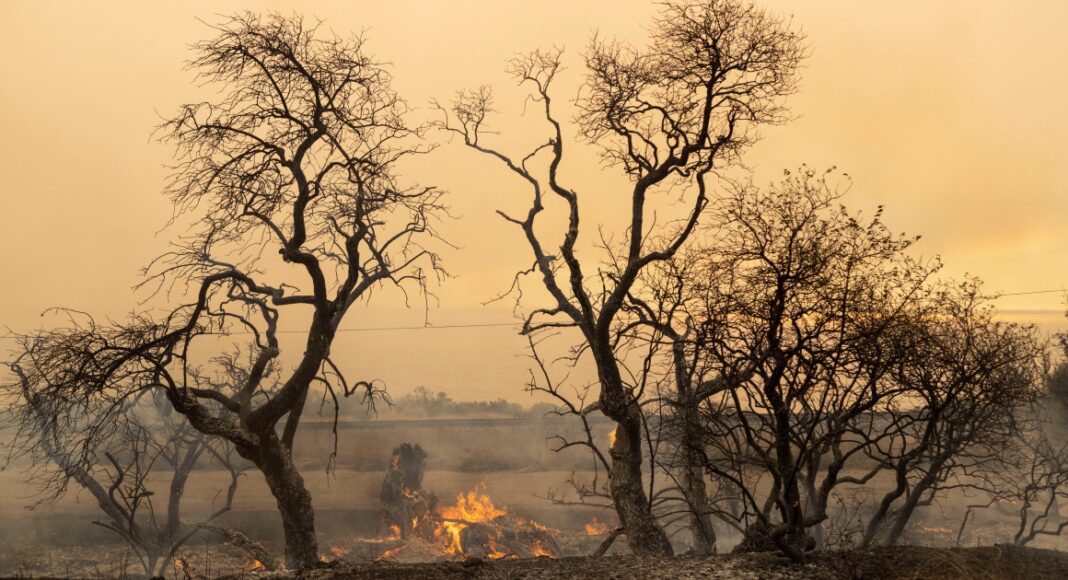San Francisco, California – Overgrown forests and increasingly destructive wildfires are the legacy of more than a century of fire suppression policy in California. Historically, state laws held people liable for damages if they started a fire that burned out of control.
But a new California law will remove the liability risk for private citizens and Indigenous people who set controlled burns, which are low-intensity fires proven to prevent catastrophic blazes. The law marks a paradigm shift in the United States, where in the pre-settler era, Indigenous people regularly set small fires to take care of the landscape.
US federal policy, however, viewed all fires as dangerous and made it a priority to extinguish them, allowing forests to grow dense, with more fuel for wildfires. Today, climate change is drying out those forests and contributing to longer wildfire seasons.
California’s Yosemite National Park is now a net carbon emitter due to more intense fires and poor forest management, according to a recent UN report.
In recent years, states have recognised the benefits of prescribed burns, but the practice must scale up significantly to bring forests back into balance. California’s new law, which comes into effect on January 1, sets the stage for private citizens and Indigenous people across the state to wield so-called “good fire”.
California has seen several huge wildfires this year, as climate change is causing a longer wildfire season [File: Robert Galbraith/Reuters]
Cultural burns
In a 1918 letter, a district ranger at Klamath National Forest wrote to his supervisor that the US Forest Service’s most important duty was to keep fires to a minimum, but “renegade whites and Indians” were setting fires “for pure cussedness”, not caring whether the fires harmed others.
He suggested that the solution was “to kill them off, every time you catch one sneaking around in the brush like a coyote, take a shot at him”. He also suggested hiring a female missionary who had “gained the confidence” of Indigenous people to convince them to adopt settler theories about fire.
Margo Robbins, a member of the Yurok Tribe in northern California and executive director of the Cultural Fire Management Council, shared the letter with Al Jazeera to show how dramatically forest policy has changed over the past century. Her community faces a high fire risk because of a heavy fuel load in their region, but liability has been a barrier to prescribed burns, as “there’s no 100 percent guarantee that [the fire] is going to stay where you want”, Robbins said.
Prescribed burns in California require permission from the land owner, and while the new law removes liability for those conducting such burns if a basic set of conditions are met, anyone whose conduct constitutes gross negligence will still be held responsible. The law covers “cultural burns” and “cultural fire practitioners”, affirming the rights of Indigenous people to use fire.
“[The law] recognises the value of this Indigenous knowledge and this experience of Native people with fire, so much so that they have said that we are on par with California-certified burn bosses,” Robbins said. “It’s huge, because it opens the door to us to start taking care of our land with fire again without fear of going to prison.”
Widespread support
This winter, Lenya Quinn-Dason, a fire adviser at the University of California Cooperative Extension and director of the Northern California Prescribed Fire Council, said she plans to set “good fires” near the city of Eureka, taking the same precautions she has always followed.
“[The law] doesn’t change the way we’re operating; it just makes us more comfortable,” she told Al Jazeera.
Quinn-Dason is part of a coalition of prescribed burn advocates who pushed for the new California law. A politically diverse group of supporters backed the legislation, including conservative ranchers, Indigenous groups and scientists, she said.
Robbins said that the law’s authors solicited not only “token” input from her group, but “went back to the drawing board” after hearing Indigenous guidance.
California has also authorised $20m in funding for a pilot fund to pay for damages if a prescribed burn gets out of control. The next step is for California and other states to ramp up the number of people trained to set prescribed burns, Quinn-Dason said, noting that “the workforce we currently have is a fraction of what we need”.
‘Critical turning point’
California is not the first state to change its prescribed fire liability laws; in 1990, Florida was the first to implement a “gross negligence” standard, less stringent than the most commonly used “simple negligence” standard. A number of other states, including Nevada, Georgia and Michigan, followed suit.
Oregon is also reconsidering its fire liability laws, as private citizens who want to set prescribed burns are running up against the same liability risks. “Many organisations and private landowners are finding it impossible to secure prescribed fire insurance coverage,” Amelia Porterfield, a senior policy adviser at the Nature Conservancy in Oregon, told Al Jazeera.
This year, the state passed two laws, one ordering state agencies to complete a study by July 2022 on the liability and insurance barriers preventing prescribed burns from scaling up, and another to assist with training more prescribed burners.
Robbins hopes that one day, across the US, Indigenous people will assert their sovereign right to use fire, without needing permission from anyone. Her vision is “that we can burn in the right place, at the right time, for the right reasons”.
“As tribal people, we know what’s best for our land,” she said. “We can make our own decisions about the rules and regulations to use in terms of using fire as a land management tool and in ceremonies.”
Robbins added that all private landowners should be able to set their own “good fire”, while gaining better access to training opportunities: “We’re at a critical turning point, and we are turning in a good direction.”



